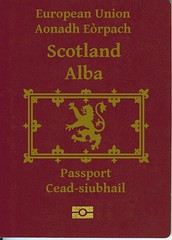rUK passports for Scots

Theresa May and Better Together are today talking about denying “British” passports to Scots after independence.
It’s a somewhat strange use of “British” (which is why I put it in quotation marks above) — surely Ms May means “rUK passports” or “EWNI passports”, given that it’d be a bit odd to use the word “British” to refer to somebody or something from the United Kingdom of England, Wales and Northern Ireland.
However, apart from her bizarre use of language, I think both sides are at fault here. Ms May and Better Together are making it sound as if people from Scotland — as the only country on Earth — will be denied British citizenship if they otherwise qualify, and some people on the Yes side seem to think that Scots should qualify for rUK passports in perpetuity, even if they have no connexions to the rUK whatsoever.
As is often the case, it’s wise to look at Ireland. According to Wikipedia, this is the current situation:
Irish citizens seeking to become British citizens are usually required to live in the UK and become naturalised after meeting the normal residence and other requirements, unless they can claim British citizenship by descent from a UK born or naturalised parent. An Irish citizen who naturalises as a British citizen does not automatically lose their Irish citizenship.
I therefore suspect the situation after independence will be as follows:
Scottish citizens seeking to become EWNI citizens are usually required to live in the EWNI and become naturalised after meeting the normal residence and other requirements, unless they can claim EWNI citizenship by descent from a EWNI born or naturalised parent. A Scottish citizen who naturalises as a citizen of EWNI does not automatically lose their Scottish citizenship.
Of course, just like people from the Republic of Ireland, Scots will most likely be allowed to live and vote in the rUK/EWNI without becoming citizens of that state:
The right of Commonwealth and Irish citizens to vote is a legacy of the Representation of the People Act 1918, which limited the vote to British subjects. At that time, “British subjects” included the people of Ireland — then part of the United Kingdom of Great Britain and Ireland — and all other parts of the British Empire. Though most of Ireland […] and the majority of the colonies became independent nations, their citizens have retained the right to vote if they live in the United Kingdom.
It’s also possible that there’ll be increased access to acquiring EWNI citizenship for a limited time, or for Scots born before a certain date. Looking again at Ireland, older people can claim British subject status, but the “facility for those born before 1949 to claim British subject status does not confer British citizenship, although it gives an entitlement to registration as such after 5 years in the UK.”
How would a ‘Scottish citizen’ be defined for the purpose of getting a passport? Would Hannah no longer have the same citizenship as me?
We don’t know yet. I presume anybody who was born in Scotland will be a citizen. I guess Hannah might have treble nationality: Scottish/EWNI/NZ.